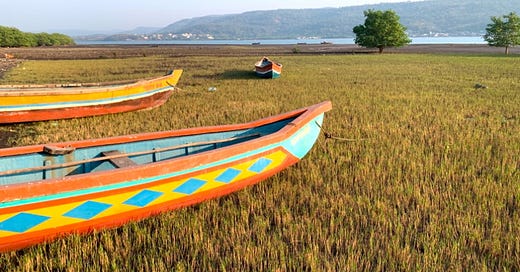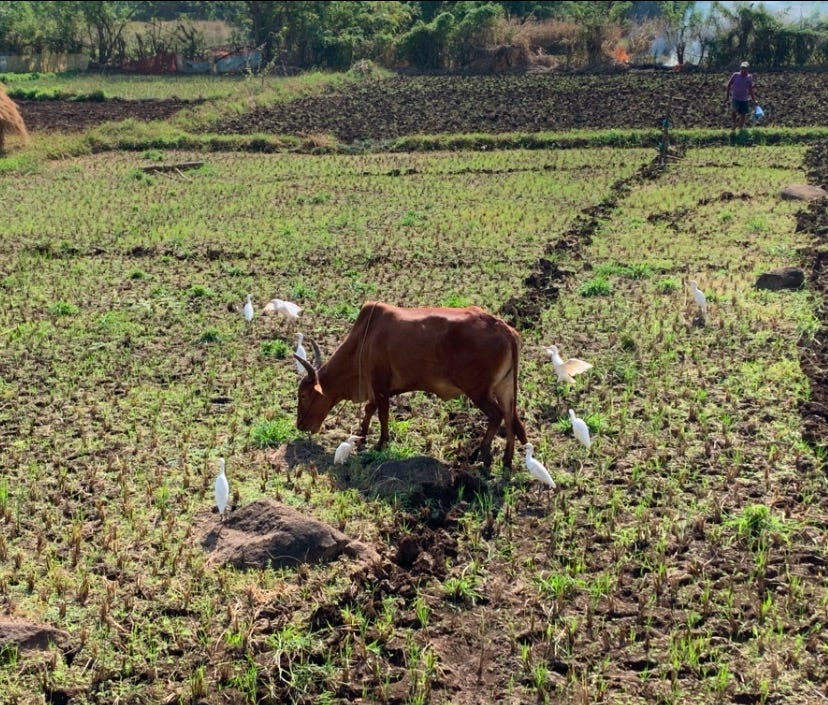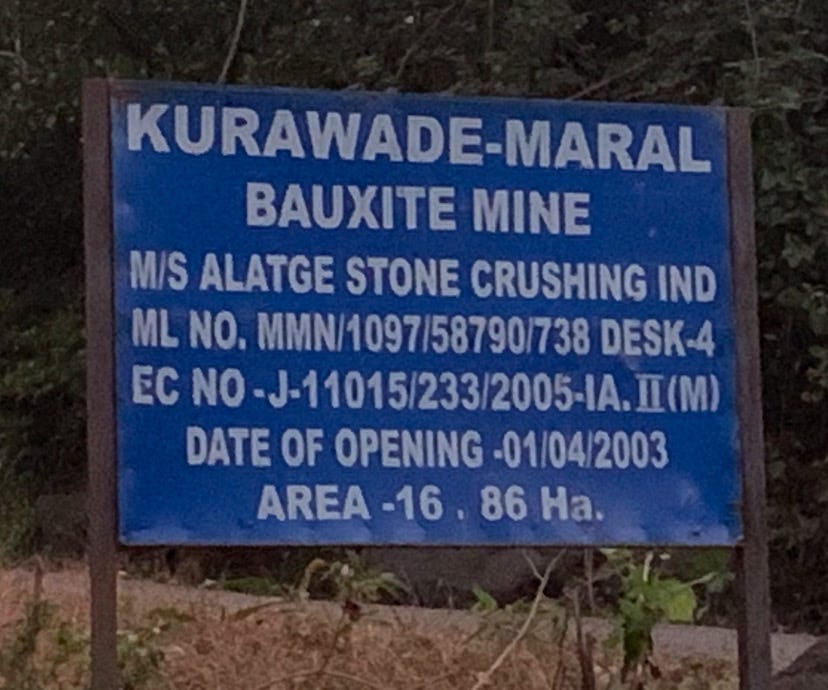These mangroves on my right have been protecting the villages from the rising sea for centuries. Tiny villages have sprung up on its edges. Some muslim, some kunbi and a few dalit houses adorn these winding roads ahead from srivardhan. Rivers hug the mangroves as they pass them to meet their mother- the sea. The land here is a mix of sand and basalt, not so suitable for mango plantations and yet some have tried hard to grow mangoes on this sandy terrain. Banyan trees grow all around, spreading its branches and holding the earth with its roots. These roots love being grounded, much like the people of this land.
The odd farmers tap the oxen with their sticks as they make sounds to hawk them further. No tractors, simply man and nature performing their balancing act. White herons meditate around these freshly ploughed land. Their meditations are helpful, because the earthworms don’t feel any movement and hence come out to catch a glimpse of the overland. Each time an earthworm moves, the heron gets into action. There are enough worms for sparrows too, the fields are vast and the ploughing process is slow. “Haa, click click, ye,” the dusky farmer makes sounds each time the oxen lose track. I too feel the need to have someone who would say, “haa, click click,” every time I feel tired.
In the afternoon I was passing a few tiny villages, Guysure, Nigdi, Saygaon. These are tiny villages, with a majority of muslim people living here. Other than their headwear, it would be hard to distinguish them from the other people living here. Konkan does this thing, it accepts everyone who understands and nurtures her. I was passing Saygaon when a 70 year old man came forward, “where do you come from?” he asked in a hybrid of marathi and hindi.
“From Mumbai! Ya Allah. Surely, he is looking after you,” he said looking up to the sky.
“You have got strength and willpower my boy, he is walking with you,” he continued while walking around and checking my trolley.
“If you go a bit further you will find a mosque on your right. There is a water cooler at the front. Please fill your bottles there. I can’t imagine walking so much, but I will get some blessings from him for guiding you a source of water. Take care boy, you have a long way to go,” with this he left for his house. I filled my bottles and prayed to that power that gave me this water. That one true God as Hindus, Christians, Sikhs, Muslims all have spoken of— the force that makes things happen, which gives us this water, this food, it gives us the stone to build our house. That God that is out there and also within me and you.
I keep thinking about this, our problems aren’t really religious, they are very different. We are kept in a perpetual state of war and fear because it helps a few people. It helps the ministers who grab the land when you are busy fighting, it helps the mining corporations steal more land and mend the laws, it helps the big businesses build more property and crush the villages. That’s what happens when we keep ourselves in this state of fear mongering and away from our spiritual core. We forget that the Gods we praise are all the same. It is this very nature that we praise. We ask her to give us what we need. Yet, we forget that now we are raping and pillaging her for our greed and instead of speaking for it, we are fighting needless battles.
The very next village has an entire mountain being robbed of its natural beauty for the bauxite and laterite thats stored in its bosom. Heavy trucks pass by throwing the villagers on the sides. The boy who died here, his head crushed underneath a mining truck—as villagers put it—was the son of a Brahmin priest in the Hari Hareshwar temple. The kingdom of dust and mining noise has taken over this sea side village, that only a few months back used to be an oasis of silence. The sound of waves overlap the constant mining sounds, changing the noise patterns for the wildlife. The sound of that bulbul calling her mate is lost within the mining sounds. With each blast, the mountain and the houses of these villagers shake a bit- eroding the soil and house structure bit by bit.
An old voice pleads me, “Can you spread our problems to the people sitting in Mumbai? We lived a silent life for the past decade. Now its unbearable. No one listens to us. We have sent letters and met with the Tahasildar and Talathis (government servants) but they give cold replies. Will you guide us?”
Here, I am sharing his story out not just to you reading this in Mumbai, Pune or Konkan, but to the entire world. Are you listening to his cries? I don’t know if I can help him, but you definitely can. Mobilise. Save this nature that we all call God equally. That old man cannot scream loud enough, but you can!!
Hey, thanks for reading this and being with me on this crazy ride. We are nearing a 1000 subscribers here at the Book of Ptah! I could have never imagined having so many readers. I want to be totally free to focus on this walk, so if you can buy me a coffee or upgrade to a paid subscription then please do.
If you can help me by contributing for this walk, then please do, I could start a kickstarter or manage crowdfunding through some other website, but none of those options are available to me here in India. So, I will be dependant on your donations. You can contribute through paypal - here’s the link. I will send out a personalised postcard if the donations are above $30 and if it’s above $100 then whatever comes out of this walk - a book, a documentary or anything else - you will be the first ones to receive it.
Thanks for your continual support. I am truly grateful!







